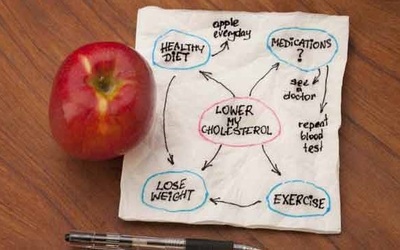High Cholesterol is a major health concern for people across the world. So, what is this cholesterol that we keep
[the_ad id=”6085″]
hearing about often? It is a fat-like substance present in the cells of our body. Cholesterol is required to make hormones, vitamin D and other substances that help us digest our food. Sometimes, it can build up extensively in arteries, and lead to blocked arteries. Therefore, knowing how much cholesterol is present in your blood is a good indicator of your risk of heart disease. When you are diagnosed with high cholesterol, it means, you have an excess amount of cholesterol in your blood. Also known as ‘lipid panel’ or ‘lipid profile’, cholesterol test helps to determine the normal, borderline, and high value. For men and women, above the ages of 34 and 45, respectively, it is important to get this test done more frequently.
Lipid Profile includes the determination of;
- Total cholesterol
- LDL or Low-density lipoprotein cholesterol, which is also known as the ‘bad cholesterol’.
- HDL or High-density lipoprotein cholesterol, which is also known as the ‘good cholesterol’.
- Triglycerides. They are the fats that are carried into our bloodstream extracted from the food we consume. Extra calories, alcohol, and sugar in our body gets converted into triglycerides and is saved in the fat cells in our body.
When is the cholesterol test recommended?
- If you have a family history of high cholesterol or heart disease, you must get yourself tested regularly, as you are at a risk of high cholesterol
- Obesity
- If you frequently consume alcohol
- Smoking cigarettes regularly
- Sedentary life with almost no physical activity
- Diabetes
- Kidney disease
- Polycystic ovary syndrome
- Underactive thyroid gland
How to prepare yourself for a cholesterol test?
- It is essential for you to tell your doctor about any health concerns or symptoms you are experiencing before your test.
- You must also let your doctor know about your family’s medical history related to the heart health and inform him about all the medications and supplements you are currently taking. This is because, a few medications, such as the birth control pills, etc. can increase your cholesterol levels. Hence, your doctor may ask you to stop taking certain medications a few days prior to the test.
How is the lipid profile test performed?
- A lipid profile is usually performed in a diagnostic lab. However, it can also be done by your doctor during your regular doctor visit.
- For this test, a blood sample is collected from a vein in the arm.
- Risks associated with this test are almost negligible. You may experience a slight dizziness or a tiny amount of pain or soreness at the site from where your blood was drawn. There is also a very slight risk of developing an infecting in the puncture area.
What is the meaning of your test results?
The cholesterol levels are measured in milligrams (mg), for cholesterol per decilitre (dl) of the blood. Usually, the ideal measurements for adults are:
- LDL – It must be around 70 to 130 mg/dL. It is better if the number is towards the lower side.
- HDL – It must be more than 40 to 60 mg/dL. It is better if the number is towards the higher side.
- Total Cholesterol – It must be less than 200 mg/dL. It is better if the number is towards the lower side.
- Triglycerides – It must be around 10 to 150 mg/dL. It is better if the number is towards the lower side.
Source:

